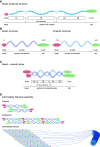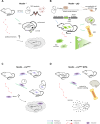Nestin-expressing progenitor cells: function, identity and therapeutic implications
- PMID: 29541793
- PMCID: PMC5948302
- DOI: 10.1007/s00018-018-2794-z
Nestin-expressing progenitor cells: function, identity and therapeutic implications
Abstract
The neuroepithelial stem cell protein, or Nestin, is a cytoskeletal intermediate filament initially characterized in neural stem cells. However, current extensive evidence obtained in in vivo models and humans shows presence of Nestin+ cells with progenitor and/or regulatory functions in a number of additional tissues, remarkably bone marrow. This review presents the current knowledge on the role of Nestin in essential stem cell functions, including self-renewal/proliferation, differentiation and migration, in the context of the cytoskeleton. We further discuss the available in vivo models for the study of Nestin+ cells and their progeny, their function and elusive nature in nervous system and bone marrow, and their potential mechanistic role and promising therapeutic value in preclinical models of disease. Future improved in vivo models and detection methods will allow to determine the true essence of Nestin+ cells and confirm their potential application as therapeutic target in a range of diseases.
Keywords: Central and peripheral nervous systems; Hematological malignancies; Hematopoietic stem cell niche; Mesenchymal stromal cells; Mouse models; Nestin; Neural stem and progenitor cells; Neurodegenerative diseases.
Figures



References
-
- Zulewski H, Abraham EJ, Gerlach MJ, Daniel PB, Moritz W, Muller B, Vallejo M, Thomas MK, Habener JF. Multipotential nestin-positive stem cells isolated from adult pancreatic islets differentiate ex vivo into pancreatic endocrine, exocrine, and hepatic phenotypes. Diabetes. 2001;50:521–533. doi: 10.2337/diabetes.50.3.521. - DOI - PubMed
Publication types
MeSH terms
Substances
Grants and funding
LinkOut - more resources
Full Text Sources
Other Literature Sources
Medical

